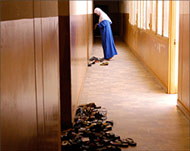Rwandans embrace Islam in wake of genocide
For long a marginalised minority, Rwanda’s Muslims have grown considerably in number and stature in the 10 years since the genocide of 1994.

Like many of his compatriots, Isaac, a lanky young stonemason, converted after the bloody events of that year when he was a soldier in the Rwandan Patriotic Front, a Tutsi-led rebellion that is now the dominant force in government.
“I converted after my unit came into Kigali and I saw how many of my fellow Tutsis has been hidden, and therefore saved, by Muslims,” he told AFP between sips of a soft drink in the populous Nyamirambo district of the capital.
According to the current government, up to a million people were killed over 100 days in 1994 during an orchestrated campaign by the Hutu government to rid the country of its Tutsi minority.
At the time, about 1.2% of the population were of the Islamic faith which was introduced to Rwanda in about 1900 by Arab traders and translators working with the German military.
One of those to swell this proportion to the current estimate of 10% is former Roman Catholic Jean-Pierre Sagahutu, who now works as a taxi driver.
“I was hiding in a septic tank behind the house of a Muslim called Idrissa. Only he knew where I was. If he had betrayed me I would have been killed,” he said.
“But he didn’t betray me,” said Sagahutu.
Many Rwandans can tell similar stories. Generally, those who sought refuge in mosques were protected from the government soldiers and militias who sought out and killed Tutsis.
Church’s record
The Catholic church, by contrast, has a sorrier record. There are many examples of mass killings inside consecrated churches and even of collusion between the clergy and the killers.
The UN court in Tanzania trying leading genocide planners and perpetrators has charged several Christian clergymen.
In February, the court convicted an Adventist pastor and his son of genocide and crimes against humanity.
In 2001, a court in Belgium, Rwanda’s former colonial power, sentenced two nuns to 15 and 12 years in jail for their roles in the genocide.
Rush to Islam
The spokesman for Rwanda’s Muslims, Salih Habimana, is an unassuming, hospitable man, sometimes seen with his wife and children at one of Kigali’s swimming pools.
 |
|
Mosques are built and financed by |
He recalls a big rush to convert to Islam immediately after the 1994 genocide, sometimes for dubious reasons.
He told AFP that some Hutus thought conversion would spare them from suspicion of complicity, while some Tutsis saw it as a way of protecting themselves in the event of another genocide.
Habimana believes Islam maintains its independence in Rwanda because it is largely self-financing.
The tiny mosques whose green and white minarets dot the Rwandan countryside, are all built and financed by local communities.
‘Mentally free’
“Rwandan people, poor as we are, we are mentally free… We know that any funding which comes from abroad comes with conditions,” he said, conceding that Rwandan Muslims do receive small contributions from Libya and Saudi Arabia.
The Zaidi bin Sabiti Quranic school in Kigali’s Bilyogo district where 40 girls and boys aged between five and 17 – selected for their knowledge of the Quran – study for free, is financed by a Saudi individual.
Rwandan Muslims, themselves extremely tolerant of other religious beliefs, are well perceived by other religions – and, since the coming to power of President Paul Kagame, himself a Protestant, almost 10 years ago – are well-represented in the administration.
The Muslim community, unsurprisingly, is anxious to maintain its newly-gained status. After the September 11 attacks on the US, the Rwandan Muslim community was quick to align itself with the government position, condemning the attacks in the strongest of terms.